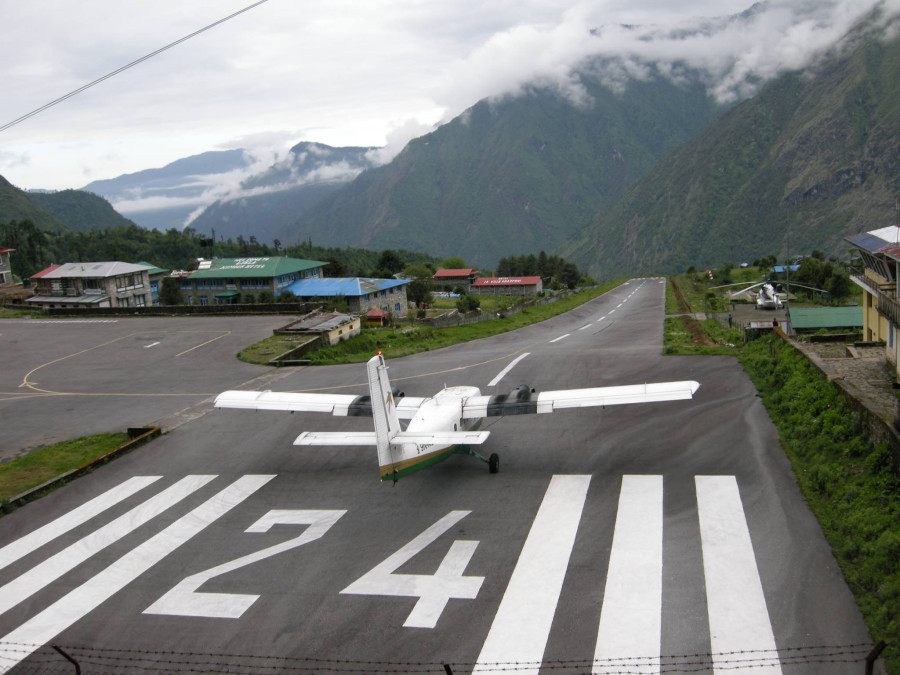Money
Air service to Lukla to be operated from Manthali
Air service to Lukla in the Himalaya will be operated from Manthali Airport in Ramechhap from Tuesday as Kathmandu’s Tribhuvan International Airport will be partially closed for renovation.
Sangam Prasain
Air service to Lukla in the Himalaya will be operated from Manthali Airport in Ramechhap from Tuesday as Kathmandu’s Tribhuvan International Airport will be partially closed for renovation.
The shift to Manthali will take off a lot of pressure from Tribhuvan International Airport as at least 90 takeoffs and landings will be transferred. Lukla, the gateway to Everest, accounts for 20 percent of the 500 daily flight movements at Kathmandu’s airport in the peak season.
Manthali, located 132 km northeast of Kathmandu, is a 5-hour drive. The airport is situated at an elevation of 474 metres above sea level and has a 518-metre runway.
The runway at Tribhuvan International Airport will remain open for only 14 hours daily while repairs are done to the pavement. It stays open for 21 hours daily during normal times. Tribhuvan International Airport, the country’s sole international airport, will be closed from 10 pm to 8 am on the following day until June 30.
As most of the flights to Lukla are conducted between 6 am and 8 am, the renovation has largely affected domestic schedules in the midst of the peak trekking and mountaineering season. Nearly 800 tourists depart for the Khumbu region daily during this period.
March to May is one of the peak tourist seasons after the September-November period. The spring season attracts hordes of trekkers and mountaineers, most of whom come to make an attempt on the world’s tallest peak Mt Everest. The tourist season is a bonanza for airlines and hotels and even the government that earns around $3.5 million by issuing climbing permits for different mountains. Everest climbing fees account for 95 percent of the revenue. “The operation cost of airlines will definitely go up as flights have to be rerouted. Foreign travellers will also be hit as they have to pay additional transportation and accommodation costs,” said Bhim Raj Rai, media manager of Yeti Airlines, which owns Tara Air, the largest operator to Lukla.
“We have to bear additional costs as aircraft crew and staff have to be accommodated in Ramechhap. Besides, we have agreed to pay fuel transportation costs to Nepal Oil Corporation to prevent a fuel shortage at Manthali airport.”
Some tour and travel operators said that lodging facilities were inadequate in Ramechhap. “We have received a few cancellations after rerouting the flights,” said Rai, adding that business would not be as good as they had expected this spring. According to him, they have cut 15-16 flights on other sectors including Pokhara, Bhadrapur, Bharatpur, Bhairahawa, Tumlingtar and Mountain.
“Although our earnings may drop this season, repairing the runway at Tribhuvan International Airport will free us permanently from our biggest headache. Frequent cracks on the runway pavement have been affecting flights for a long time.”
Ghanshyam Acharya, senior general manager of Sita Air, said that the repairs would cause delays, so Manthali airport is the best option. “The window for Lukla flights is small in the mid-morning due to the weather factor. So we cannot take that risk. Manthali is our best option.” Normally, mid-morning tail winds force Lukla airfield to close frequently.
On a normal day, 90 flights take off and land on the tiny, treacherous runway at Lukla airport which is perched on a steep cliff.
Rupesh Joshi, marketing director of Buddha Air, said they were forced to cut only three-four flights daily due to runway renovation. “Based on the current flight plan, it’s not a big deal, but we don’t know what will happen when we actually face the situation. As the airport will have a short operation period, flights will depend on the weather factor. If the weather is bad, we have to fly on instrument flight rules. Under this rules, which takes a long time for flight preparation, we may have to cut 50 percent of our daily flights.”
Instrument flight rules is a set of rules that govern aircraft that fly in instrument meteorological conditions because the pilot navigates only by reference to the instruments in the aircraft cockpit. “We cannot immediately say what effects the short airport operation window will have on us.”
Airport spokesperson Pratap Babu Tiwari said that at least 15 percent of the international flights would be affected by the runway renovation project. “All airlines were told to reschedule their flights two months ago, so the impact will not be great.” Airlines have made a temporary summer schedule valid for three months, and it has been approved,” said Tiwari.
Amid criticism that the airport authority has initiated the renovation work during the peak tourism season, officials said that they did not have an alternative. “Renovation of the runway that requires paving the runway with fresh asphalt cannot be done during the winter (December-February) and rainy season (June-August),” said a project official. “If we begin during the September-November period, it is also the country’s peak tourism and festive travel period.”
The runway at Tribhuvan International Airport is being renovated in a Rs3.78-billion project scheduled to be completed on June 30. The 3,050-metre-long dilapidated runway will be rehabilitated as damaged pavement has frequently disrupted flights. This is the ‘most critical project’ that has been planned at the airport, authorities said.
For the last seven years, aircraft weighing more than 196 tonnes have been barred from Tribhuvan International Airport to prevent further damage to the runway. The old runway has been affecting smooth operation of aircraft due to repeated occurrences of cracks in the pavement.




 20.12°C Kathmandu
20.12°C Kathmandu














